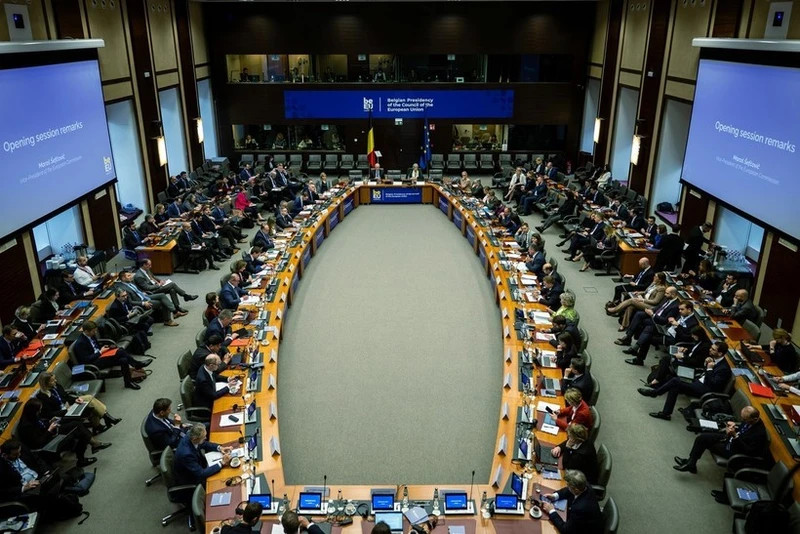The summit took place in the context of the Old Continent facing many challenges in geopolitics, economics, defence and security. A series of urgent issues need to be resolved by the EU, notably building a common defence strategy to deal with security challenges, the humanitarian situation in Gaza, the growing economic gap with the US and the risk of falling behind in terms of technology and enhancing food security.
Strengthening internal strength
The first major issue discussed by European leaders at this extraordinary summit is the escalating violence in the Middle East after Iran attacked Israel. The leaders of 27 EU countries agreed to strengthen sanctions against Iran while sending the necessary message to call for calm and avoid any violent actions that could cause unpredictable consequences in the area. The summit also stressed the importance of finding consensus in dealing with global security challenges, and the EU is committed to continuing close cooperation with international partners to maintain stability and peace in the area.
In the context of increasing global geopolitical tensions, the EU faces the need to strengthen its defence industrial capacity. European Commission (EC) President Ursula von der Leyen said the EU should focus on innovation to ensure that Europe has an advantage over new technologies that are being deployed in various conflicts all over the world.
The EC President also said that the threat of war may not be imminent, but that does not mean it cannot happen. The EU should prepare for every scenario. This should start with the urgent need to rebuild, replenish and strengthen the armed forces of member states.
In March, the EU launched a 1.5 billion EUR strategy to promote the defence industry. However, many officials said this number is not enough. France, Estonia and many other members have raised the need for a larger programme with collectively borrowable financing of up to 100 billion EUR.
However, that effort has faced opposition from countries that want to cut spending, led by Germany. This is an issue on which European leaders continue to seek consensus.
Increasing competition
Another challenge facing the EU is boosting the European economy. The EU fears the bloc's position is weakening compared to its main rivals, while the US attracts more and more investment and China strongly supports its industries. EU leaders propose stimulus measures to reinvigorate the region's economic strength. These measures include investment in advanced industries, the promotion of research and development, and international trade cooperation. The EU was also warned that the bloc faces a risk of falling further behind the US if there are no significant adjustments to the common market.
European businesses are being hit hard by the conflict in Ukraine, which has caused energy prices to skyrocket, by subsidies and easing regulations. Data show that the EU economy grew by only 0.5% in 2023, lower than the US rate of 2.5%. In addition, the EU is also concerned about the risk of falling behind in important technologies in the future, related to solar panels, electric batteries, semiconductor chips and artificial intelligence (AI). The EU estimates an additional 620 billion EUR per year is needed to finance the transition to clean energy and digitalisation. The EU needs to mobilise private investment capital, but European start-ups face difficulties accessing large capital, forcing them to seek investment from other countries. It is estimated that each year more than 300 billion EUR of savings in the EU will be used for investment in the US market. Faced with this situation, the EU needs to establish a savings and investment union to prevent the flow of European money to other markets.
Creating economic strength
Discussions also focused on reviewing existing economic policies and finding new cooperation opportunities to strengthen Europe's competitiveness in the global market. At the same time, promoting a positive business environment and ensuring fairness and transparency in trade relations are also considered important factors for the European economic recovery and development in the context of the region’s still gloomy economic picture.
The EC forecasts that the overall budget deficit of the Eurozone in 2024 will decrease to 2.8% of GDP, compared to 3.2% in 2023, then continue to 2.7% of GDP in 2025. Meanwhile, the European Central Bank (ECB) forecasts consumer inflation will decrease from 5.4% in 2023 to 2.3% in 2024, 2.0% in 2025 and 1.9% in 2026.
The economic and financial situation and the close coordination and management of the EU's macroeconomic policies are also among the important issues. Experts say it is time for the EU to reaffirm its strong determination to make decisive progress towards a Capital Markets Union (CMU).
In March, EU leaders agreed on a tighter fiscal policy for the European Economic Area (EEA) from 2025, helping to reduce inflation and stabilise public finances after excessive spending due to the COVID-19 pandemic and the energy price crisis. The European Council has endorsed a recommendation calling for a stricter overall fiscal stance in the EEA region. The new regulations are said to be more consistent with the region's macroeconomic outlook on the need to enhance financial sustainability, support the ongoing deflation process and maintain flexible policies in the face of the unstable situation.
Creating a well-functioning and efficient common capital market through promoting the CMU is essential for Europe. CMU is considered one of the important components in the renewed focus on the Eurozone’s competitiveness. At this extraordinary summit, the capital market integration strategy was also discussed more in depth.
Faced with security challenges and profound changes in the global economy, EU countries are mobilising all resources to overcome the difficult period. More than ever, the Old Continent needs to further promote its internal strength and solidarity to find a common voice to overcome "shocks", recover the economy and maintain the bloc's position.
















